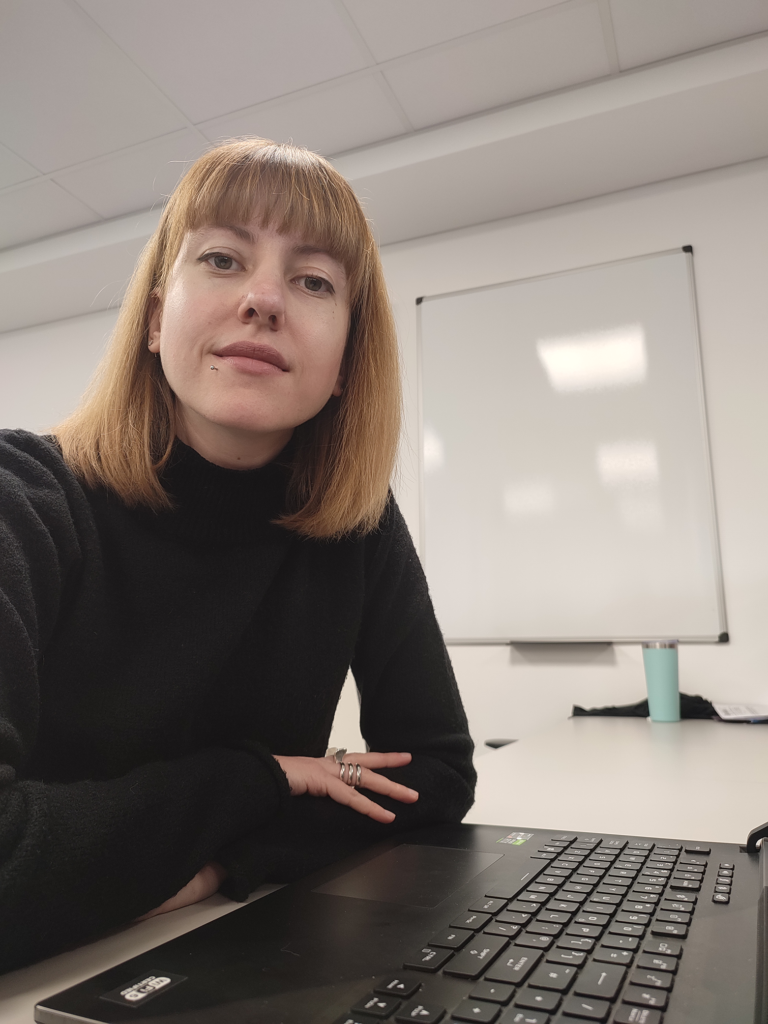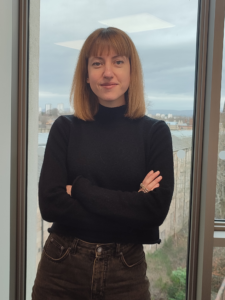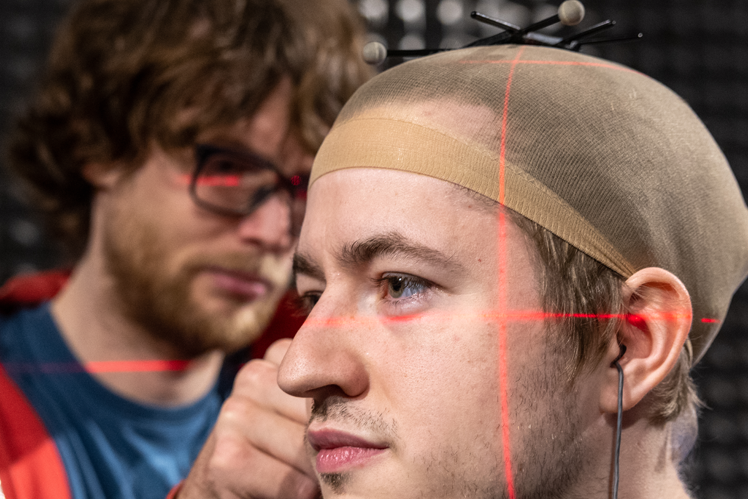In profile: Eva Fringi
Meet Eva Fringi. She is a Research Associate at the University of Glasgow in the School of Computing Science. She has a BSc in mathematics and a MA in Philosophy of Mind and Cognitive Science. Her PhD thesis focused on the effects of child language development on the performance of automatic speech recognition. Eva’s area of expertise spans various disciplines such as: signal processing, automatic speech recognition, children’s speech development, machine learning for developmental speech errors detection, and neuropsychological assessment.

Check out Eva’s publications and networks ? researchgate.net/profile/Eva-Fringi
Eva’s work and career
- Why did you choose to become a scientist?
First, I chose to become a scientist because I enjoyed mathematics in high school. I was drawn to the puzzle element of science and the rewarding feeling of solving a problem. Later on, I began admiring the scientific process; the care and accuracy which has to be employed in order to design and test a hypothesis, which is the same across subjects. It gave me the notion that by exposing myself to it, my mental capacity would keep growing.
- Do you come from an academic family?
No, I am the first person in my family to have a postgraduate degree.
- How did you choose your field of study?
I started with a great interest in mathematics, which later concentrated on the problem-solving aspect of it. This combined with my keen interest in the study of human cognitive processes, led me to reach out for interdisciplinary projects that combined the computational element of problem-solving with the psychological element of human cognition.
- Did you have a role model that influenced your career pathway?
My PhD supervisor has been a big influence on my career choices.
- What are you working on in SONICOM: in the past, now, or soon?
I am working on the assessment of immersive audio for AR/VR interactions. My role is to explore how listeners’ varying virtual proximity (closeness) to different speakers affects their judgement on personality traits. I then use this information to automatically classify how different speakers are most likely to be perceived with respect to their personality traits. This initially involved a lengthy procedure of designing and conducting experimental sessions in order to collect a fully annotated new speech corpus (database of speech audio files). This corpus is now collected and currently being processed and analysed using social signal processing and machine learning methodologies. The aim is to eventually inform the development of a socially intelligent VR/AR audio environment which will cater for users’ different social dynamics.
- What are your biggest achievements, and what are your biggest failures?
My biggest achievement is that I am employed to do the work I enjoy, even though academia is a highly competitive job market. Acquiring my PhD, making publications, doing well on job interviews, all these count as confidence boosts to keep me motivated. As far as failures are concerned, I do not find it helpful to think in such terms, especially for women in academia, so I don’t use this type of narrative to describe my work experiences.
- What is a typical day like for you?
Until recently I was carrying out the data collection part of our project. I started the day relatively early and went to the university to run some experimental sessions. I answered emails and worked on my code for data analysis in between sessions. I participated in a couple of online or in person meetings every other day too. Now that the data collection is completed, I am more flexible location wise, so I might go to the office or work from home and spend my day writing code to analyse the data, get results and try to interpret them.
- What are the hardest parts related to your work?
Research is always vast with possibilities for different ways to analyse your data and different questions to ask and try to answer. It is easy to get lost in the volume of work already done in the field or peripheral to the field and lose focus from your main goal. More simply, if I want to use method X to test hypothesis Y, should I prove first that this is the right method to go with? What have other researchers done in the past? Is proving this a research question in its own right? Do I need to prove the reasoning for every choice I make? Such questions tend to delay progress and make it appear impossible to make a start, but luckily discussions with colleagues can help regain perspective and get right on track.
 Did you ever doubt your abilities as a scientist? Why? How did you handle these situations/feelings?
Did you ever doubt your abilities as a scientist? Why? How did you handle these situations/feelings?
I have yet to meet an academic or researcher who is not doubting or has not doubted themselves in the past. The impostor syndrome is part of our work, and it definitely has affected me at times. Academia is a highly competitive environment built in mythical idolisation of knowledge and scholarship, so comparisons between oneself and those greatly accomplished (or those considered greatly accomplished) are inevitable. I think the narrow nature of specialisation that is demanded by academic standards exacerbates such comparisons and cause self-doubt, but at the same time can be used against it, since each researcher has their own niche area of expertise and something unique to contribute, comparing themselves with others is fruitless and redundant. My way to cope with this feeling is by reminding myself of all the small victories and accomplishments I consider important in my own experience.
- What (or who) motivated you in difficult times?
Encouragement by the people closest to me has been key to keeping me motivated.
- In ten years, what do you hope to have accomplished in terms of your work?
In 10 years’ time I hope to have authored several influential publications in my field, have collaborated with scientists I look up to, and have had the opportunity to share my scientific experience through teaching.
- During your career, have you been specifically mentored or supported by someone?
- My PhD supervisor has been a great mentor who offered me support throughout the arduous process of the PhD and many times after that.What is the funniest or most memorable thing that has happened to you while working in science?
I submitted my PhD thesis for the University of Birmingham, UK while I was in Hyderabad, India for a conference. It was an outrageous experience filled with adrenaline, as I was writing up to the last day from my hotel room, and then a few hours after submission I had to do a presentation at the conference. We still joke about this with my PhD supervisor.
Some musings on women in science
- How do you feel the current environment is for women in science?
It has of course improved since the recent past, but there’s still a lot of ground to be covered. Women have more representation in scientific teams, but still far from a 50-50 ratio. In fact, even in the few fields primarily populated by women, the high-ranking positions are still mostly occupied by men. Opportunities are seemingly equal in the modern western society, however a woman’s path is less straightforward than a man’s all other things being equal. Conscious or unconscious bias and internalised misogyny are less pronounced but still present in science as well as other domains of professional life.
- Where do you see women in science in 10 years’ time?
Hopefully, in 10 years’ time we will be closer to a 50-50 ratio between men and women in science, with a more evenly spread distribution of women in high-profile scientific posts. I don’t think the problem will be completely solved because we live in a deeply rooted patriarchal society, but I do believe in gradual progress brought by the current feminist movement.
- What kind of prejudices, if any, did you have to face? How did that make you feel? Were you able to overcome these?
As a woman in science, I had to mute plenty of the patronising voices that at times would commend me for common knowledge I seemed to have “in spite of being a woman”, that would make frequent references to my domestic skills or reproductive intentions as professionally relevant, that would create an atmosphere of doubt around my expertise requiring me to thoroughly justify my every remark and be constantly alert to prove I have earned each of my accomplishments, all taking aim at my self-confidence. I persevered and managed to restore my confidence, but this required a lot of effort on my part which male colleagues are exempt from.
- In your opinion, which changes, if any, are needed in the scientific system to engage more women in science and create more future female scientists?
I believe in a top-down approach to systematic change, where more key roles will be offered to female scientists, bridging the gap between male and female representation in influential posts and thus inspiring more future female scientists. For this to materialise I would support organisations opening job vacancies only to female candidates until their male-to-female employee ratio evens out.
- Do you have anything else that you’d like to say to young, female audiences?
Keep yourselves motivated, allow yourselves to err, work hard and stay curious!
Outside the lab
- Besides your scientific interests, what is fun for you?
- I enjoy cinema, literature, music concerts, dance performances, and practising yoga.Is it hard to manage both career and private life? How do you manage both?
Yes it can be tricky, I always try to keep the balance and compensate when it is lost.
- If you had the option to give advice to a younger version of yourself, what would that be?
Stop worrying so much, things will get done!




